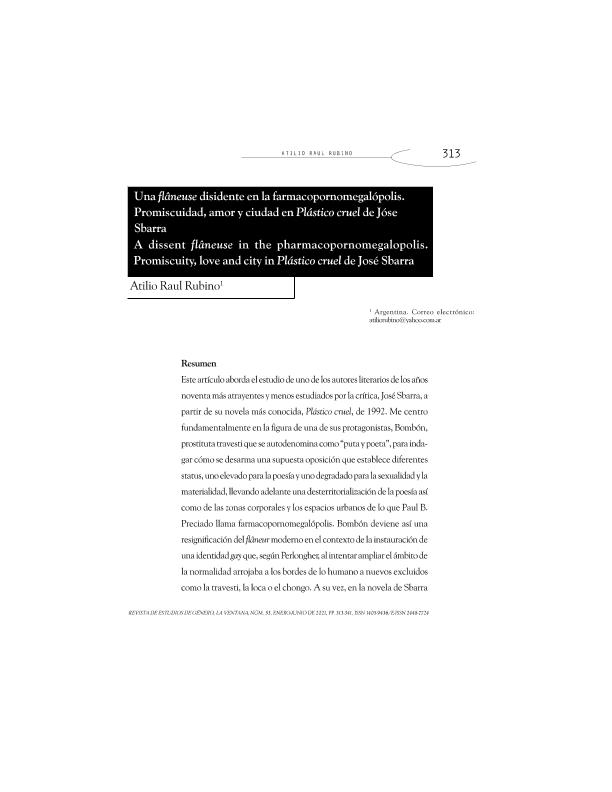Mostrar el registro sencillo del ítem
dc.contributor.author
Rubino, Atilio Raúl

dc.date.available
2022-09-28T19:17:01Z
dc.date.issued
2021-04-20
dc.identifier.citation
Rubino, Atilio Raúl; Una flâneuse disidente en la farmacopornomegalópolis. Promiscuidad, amor y ciudad en Plástico cruel de Jóse Sbarra; Universidad de Guadalajara; La Ventana; 6; 53; 20-4-2021; 313-341
dc.identifier.issn
1405-9436
dc.identifier.uri
http://hdl.handle.net/11336/170824
dc.description.abstract
Este artículo aborda el estudio de uno de los autores literarios de los años noventa más atrayentes y menos estudiados por la crítica, José Sbarra, a partir de su novela más conocida, Plástico cruel, de 1992. Me centro fundamentalmente en la figura de una de sus protagonistas, Bombón, prostituta travesti que se autodenomina como “puta y poeta”, para indagar cómo se desarma una supuesta oposición que establece diferentes status, uno elevado para la poesía y uno degradado para la sexualidad y la materialidad, llevando adelante una desterritorialización de la poesía así como de las zonas corporales y los espacios urbanos de lo que Paul B. Preciado llama farmacopornomegalópolis. Bombón deviene así una resignificación del flâneur moderno en el contexto de la instauración de una identidad gay que, según Perlongher, al intentar ampliar el ámbito de la normalidad arrojaba a los bordes de lo humano a nuevos excluidos como la travesti, la loca o el chongo. A su vez, en la novela de Sbarra podemos pensar también en un cuestionamiento a la naturalización del cuerpo a partir del binomio natural/artificial. Así, los cuerpos hegemónicos respecto a la cisheteronorma aparecen des-naturalizados. En ese sentido, es el personaje de Bombón el que desde una posición abyecta se erige como sujeto deseante (más que como objeto del deseo o de intercambio mercantil). La promiscuidad, así, deviene en un agenciamiento del propio cuerpo y un desvelamiento de que el amor y la familia son fuertes dispositivos de disciplinamiento corporal. Con un estilo fragmentario y polifónico que pasa de lo lírico a lo narrativo, siempre en un tono irónico llevado por momentos al absurdo, la novela de Sbarra constituye para la época un fuerte cuestionamiento a los estándares de la familia tradicional así como a la incipiente normalización de lo gay.
dc.description.abstract
This article deals with the study of one of the most attractive and least analyzed literary authors from the 1990s, José Sbarra, in his most widely known novel, Plástico cruel, from 1992. I essentially focus on the figure of one of its main characters, Bombón, a transvestite prostitute who calls herself “a whore and a poet”, in order to look into how an apparent opposition that sets different statuses —one that is elevated towards poetry and the other that is degraded to sexuality and materiality— is taken apart by carrying out a deterritorialization of poetry as well as of the body areas and the city spaces of which Paul B. Preciado calls a pharmaco-porno-megalopolis. Bombón thus becomes a redefinition of the modern flâneur in the context of the establishment of a gay identity, which — according to Perlongher— when trying to broaden the scopes of normality, pushed away new outcasts —such as the transvestite, the fairy or the pickup— to the borders of what is human. At the same time, in Sbarra’s novel, we can also think about a questioning of the naturalization of the body from the pairing natural/artificial. Therefore, the hegemonic bodies (regarding the cisheteronormativity) seem to be un-naturalized. In this sense, it is the character of Bombón the one which, from an abject position, sets itself as a desiring subject (rather than an object of desire or an object for commercial exchange). This way, promiscuity becomes agencement for the own body and a revelation of the fact that love and family are strong devices for body disciplining. With a fragmentary and polyphonic style that goes from lyric to narrative, always with an ironical tone, which sometimes is taken to the absurd, Sbarra’s novel stands out in its time as a strong questioning of the traditional family’s standards as well as of the incipient normalization of gayness.
dc.format
application/pdf
dc.language.iso
spa
dc.publisher
Universidad de Guadalajara

dc.rights
info:eu-repo/semantics/openAccess
dc.rights.uri
https://creativecommons.org/licenses/by-nc/2.5/ar/
dc.subject
LITERATURA ARGENTINA
dc.subject
TRAVESTISMO
dc.subject
DISIDENCIA SEXUAL
dc.subject
PROMISCUIDAD
dc.subject
JOSÉ SBARRA
dc.subject.classification
Literaturas Específicas

dc.subject.classification
Lengua y Literatura

dc.subject.classification
HUMANIDADES

dc.title
Una flâneuse disidente en la farmacopornomegalópolis. Promiscuidad, amor y ciudad en Plástico cruel de Jóse Sbarra
dc.title
A dissent flâneuse in the pharmacopornomegalopolis. Promiscuity, love and city in Plástico cruel de José Sbarra
dc.type
info:eu-repo/semantics/article
dc.type
info:ar-repo/semantics/artículo
dc.type
info:eu-repo/semantics/publishedVersion
dc.date.updated
2022-08-10T15:49:35Z
dc.identifier.eissn
2448-7724
dc.journal.volume
6
dc.journal.number
53
dc.journal.pagination
313-341
dc.journal.pais
México

dc.journal.ciudad
Guadalajara
dc.description.fil
Fil: Rubino, Atilio Raúl. Consejo Nacional de Investigaciones Científicas y Técnicas. Centro Científico Tecnológico Conicet - La Plata. Instituto de Investigaciones en Humanidades y Ciencias Sociales. Universidad Nacional de La Plata. Facultad de Humanidades y Ciencias de la Educación. Instituto de Investigaciones en Humanidades y Ciencias Sociales; Argentina
dc.journal.title
La Ventana
dc.relation.alternativeid
info:eu-repo/semantics/altIdentifier/url/http://revistalaventana.cucsh.udg.mx/index.php/LV/article/view/7171
dc.relation.alternativeid
info:eu-repo/semantics/altIdentifier/doi/https://doi.org/10.32870/lv.v6i56
Archivos asociados
